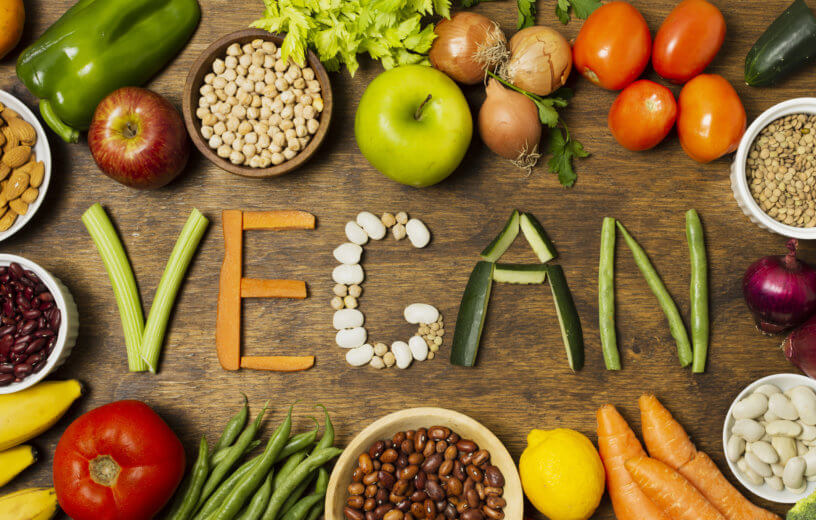EXETER, United Kingdom — Vegan gym rats have a reason to celebrate. Using vegan protein works just as well to build muscle as animal proteins, a new study reveals.
Popular meats like chicken, turkey, and ground beef have long been key ingredients for meals among muscle-centric fitness fanatics. Similarly, dairy-based proteins like whey and casein are other common forms of animal proteins. The rise of plant-based diets and “clean eating” in recent years, however, have pushed many to avoid red meat or animal-based protein options entirely. As a result, health food aisles at the grocery store are being stock with more high-protein products made from pea or soy protein in particular.
But many are left wondering whether these vegan proteins can lead to the same types of gains in muscle size and strength that lifters see from animal proteins.
“Our study demonstrates that mycoprotein is comparable to animal proteins in terms of its ability to facilitate increases in muscle mass and strength in young adults who are regularly engaging in resistance training,” says study co-author Alistair Monteyne, a researcher at the University of Exeter in the United Kingdom, in a media release.
In this study, the team examined a mycoprotein derived from fungi — which is a meat-free protein on the market as Quorn. The findings show the vegan alternative supports muscle growth during resistance training as well as people who eat an omnivorous diet. About one in 10 American adults consider themselves vegan or vegetarian, according to estimates.
“It is well established that muscle building can be augmented by adhering to a high protein diet,” says Monteyne. “However, it was previously unclear as to whether non-animal derived diets and non-animal derived protein sources, such as Quorn’s mycoprotein, could support muscle building during resistance training to the same extent as omnivorous diets and animal-derived protein sources.”
Vegan proteins actually built more muscle
The study consisted of two phases. In the first half, 16 healthy young adults followed a three-day diet where they ate protein-filled meals made from meat or Quorn’s mycoprotein sources. Researchers measured their metabolism levels during the three-day diet. In the second phase, 22 other healthy young adults underwent a 10-week progressive resistance training program while eating a high-protein omnivore diet or a vegan diet filled with mycoprotein.
There was no significant difference in muscle gains and strength between the two groups. In other words, the mycoprotein-rich vegan diet produced similar muscle-building results during resistance training as people who get their protein from meat.
People eating a high-protein omnivorous diet showed a 5.7-pound increase in muscle mass. The vegan group, in contrast, gained 6.83 pounds in mass. Both groups showed an 8.3-percent size increase in their thigh muscles during the experiment.

“We now have a strong body of evidence, perhaps more than is available for any other alternative protein source, to show that mycoprotein is an effective protein food to support muscle maintenance and growth,” Monteyne says.
Switching to a meat-free protein like mycoprotein for your workouts might also help the planet make some gains against climate change. The study builds on a separate report from the University of Exeter researchers, finding that alternative meats are a significant way humans can reduce greenhouse gas emissions from livestock farming.
What types of plant-based proteins are there?
Plant-based proteins can of course be enjoyed simply by purchasing vegan protein powders that are specific to the type of protein you prefer. Here are some of the more common types of vegan proteins and food they are found in:
- Soy protein (tofu, tempeh, soy milk, edamame)
- Pea protein (peas, split peas)
- Rice protein (brown rice)
- Hemp protein (hemp seeds)
- Pumpkin seed protein (pumpkin seeds)
- Chia seed protein (chia seeds)
- Quinoa protein (quinoa, quinoa flakes)
- Chickpea protein (hummus, chickpeas, falafel)
- Almond protein (almonds, almond milk, almond butter)
- Lentil protein (lentils, hummus, vegan lentil soup)
There are many other types of plant-based proteins available, such as sunflower seed protein, peanut protein, and oat protein. Each type of protein has its unique nutritional profile and benefits, so it’s important to choose a variety of protein sources to ensure adequate intake of all the essential amino acids and other important nutrients. Vegan proteins that are complete contain all of the nine essential amino acids that the human body needs to function properly. Essential amino acids cannot be produced by the body and must be obtained from the diet.
Complete proteins are typically found in animal-based foods, such as meat, fish, eggs, and dairy products. However, there are a few plant-based sources of complete proteins, such as soy and quinoa.
Incomplete proteins, on the other hand, are proteins that do not contain all of the essential amino acids. Most plant-based protein sources are incomplete, but by combining different plant proteins, one can obtain all the essential amino acids. For example, combining grains and legumes, such as rice and beans, creates a complete protein. Other examples of incomplete protein sources include nuts, seeds, and vegetables.
Of course, while it’s important that we try to consume all of the essential amino acids, one does not necessarily have to consume them in every meal. The body can store amino acids and use them to form complete proteins later on. However, it is still essential to consume a balanced diet that includes a variety of protein sources to ensure adequate intake of all the essential amino acids.
The study is published in the Journal of Nutrition.

This is total rubbish. Who paid for this?
We know, that plant proteins are NOT as bioavailable as animal proteins.
The amount of plant material you would need to consume to receive the amount of bioavailable protein we need to stay healthy, let alone build muscle, is more than most humans could consume per day.
Our species are meat eaters. That is fact. Anthropology has proven this.
It’s time people looked after their health & wellbeing by consuming a species appropriate diet
Correct. Look at Bill Pearl from the 60s.